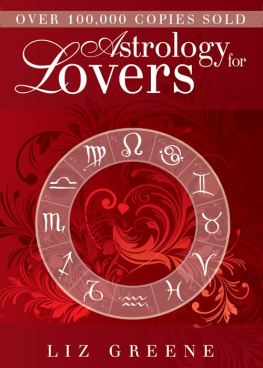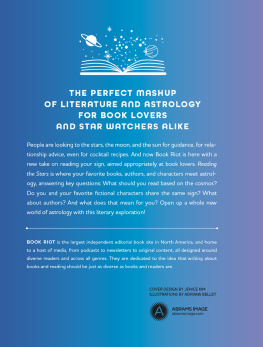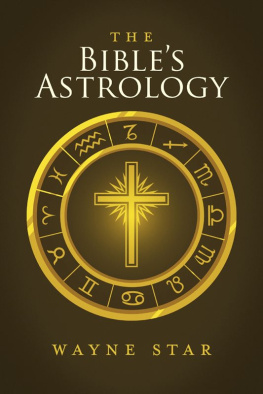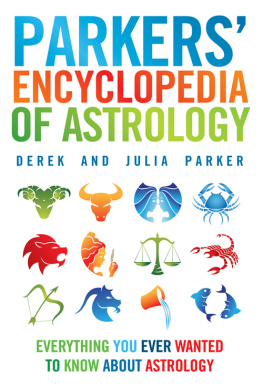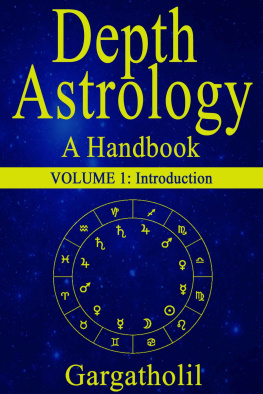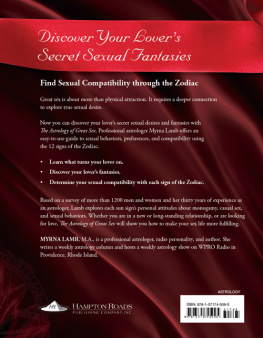Liz Greene - Astrology for Lovers
Here you can read online Liz Greene - Astrology for Lovers full text of the book (entire story) in english for free. Download pdf and epub, get meaning, cover and reviews about this ebook. year: 2009, publisher: Red Wheel Weiser, genre: Religion. Description of the work, (preface) as well as reviews are available. Best literature library LitArk.com created for fans of good reading and offers a wide selection of genres:
Romance novel
Science fiction
Adventure
Detective
Science
History
Home and family
Prose
Art
Politics
Computer
Non-fiction
Religion
Business
Children
Humor
Choose a favorite category and find really read worthwhile books. Enjoy immersion in the world of imagination, feel the emotions of the characters or learn something new for yourself, make an fascinating discovery.
- Book:Astrology for Lovers
- Author:
- Publisher:Red Wheel Weiser
- Genre:
- Year:2009
- Rating:5 / 5
- Favourites:Add to favourites
- Your mark:
- 100
- 1
- 2
- 3
- 4
- 5
Astrology for Lovers: summary, description and annotation
We offer to read an annotation, description, summary or preface (depends on what the author of the book "Astrology for Lovers" wrote himself). If you haven't found the necessary information about the book — write in the comments, we will try to find it.
Astrology for Lovers — read online for free the complete book (whole text) full work
Below is the text of the book, divided by pages. System saving the place of the last page read, allows you to conveniently read the book "Astrology for Lovers" online for free, without having to search again every time where you left off. Put a bookmark, and you can go to the page where you finished reading at any time.
Font size:
Interval:
Bookmark:


First published in 1989 by
Weiser Books
An imprint of Red Wheel/Weiser, LLC
With offices at:
500 Third Street, Suite 230
San Francisco, CA 94107
www.redwheelweiser.com
This edition published 2008
Copyright 1980, 1986 Liz Greene
All Rights Reserved. No part of this book may be used or reproduced in any manner whatsoever without written permission, except in the case of brief quotations in critical articles or reviews. An earlier version of this work was first published in 1980 by Stein & Day, New York, as Star Signs for Lovers.
ISBN: 978-1-57863-426-2
Library of Congress Cataloging-in-Publication Data
Greene, Liz
Astrology for lovers / Liz Greene.
p. cm.
1. Astrology. 2. LoveMiscellanea. I. Title.
BF1729.L6G69 1989
133.583067dc20
Printed in Canada
TCP
10 9 8 7 6 5 4 3 2 1
www.redwheelweiser.com
www.redwheelweiser.com/newsletter
Why, queries Woody Allen in the film Annie Hall, do we bother with such problematic, complicated, tortuous things as relationships? Why make the effort to learn something about, care for, give to, take from, cherish, fight, love other human beings? Woody Allen answers his own question with a joke:
My brother has gone crazy. He thinks he's a chicken.
Then why don't you commit him?
Because I need the eggs, says Woody.
Relationships are something like that.
It's certainly fashionable at the moment, in some parts of society, to abandon the often outmoded values of our parents and grandparents. For one thing, it's obvious to a lot of people that they haven't worked; the marriages of the past were no better than the marriages of the present. There were fewer divorces, of course; but then you had two people living side by side until death did them part who filled the house with silent enmity and poison that caused not a few psychological conflicts in their children. Even if you don't believe in psychology, it's sadly apparent that the modern family unit needs a little refurbishing if it's to continue to exist at all. Have a look at a few divorce statistics.
Now, along with the state of the economy, the dangers of nuclear destruction, the energy crisis, the overpopulated and undervalued earth, the endangering of animals (and humans) and the other favourite nightmares of this, the dawn of what astrology calls the Aquarian Age, we also have a big problem with human relationships. This is attributable to various things, depending on your viewpoint. Morals are collapsing, not enough good old-fashioned discipline, not enough faith in God and the Catholic Church, not enough faith in God and the Anglican Church, sexual repression, capitalism, communism, and any other scapegoat you care to think of that will exonerate you, or me, from taking responsibility for our own messes. In an age of superlative technology where, for the first time, millions can purchase a little leisure, millions of people also, desperate to understand why everything is so damned meaningless and why they're so lonely, turn to disciplines and beliefs so ardent that we can't even fathom their origins. What are now known as esoteric studies are slowly but steadily encroaching on the domain once held tightly in the grip of orthodox religion.
The word esoteric simply means inner. Esoteric can refer to a lot of different things, from the Maharishi and Transcendental Meditation, to the Children of the Temple of God in Guyana. Esoteric studies can range from the ridiculous to the sublime. They can plumb ancient and learned treatises on alchemy, magic, Hermetic philosophy and the kaballah. They can explore mysteries like the Bermuda Triangle. Inner is about parapsychological phenomena, dreams, visions, altered states of consciousness. It's about synchronistic phenomena, precognitive dreams, telepathy, clairvoyance. It's also about depth psychology, the study of the human soul. And it can also be about astrology.
Can astrology familiar to us all through that silly but irresistible column in the daily newspaper wherein Madame Somebody-or-other tells one that Wednesday will be a rotten day possibly contribute anything at all to our dilemma of living on an overpopulated planet where we must rub shoulders (and souls) with all those strangers?
Lately, there has been a good deal of public outcry from academia against astrology as well as from the scientific community at large; which has apparently got a little frightened by its popularity. (After all, if there's something mysterious about life which orthodox science can't answer, what sort of world do we live in?) But no matter how strenuously it's proclaimed that astrology is really a load of medieval superstitious nonsense, belief in it is spreading. Once upon a time everyone read those ubiquitous sun sign columns with tongue-in-cheek, laughing all the while still secretly wondering whether Wednesday really would be a rotten day and heaving a sigh of relief when it wasn't. (Irresistible, that stuff. It touches close to the bone of that favourite of all human pastimes reading about oneself.) But no one would dare admit especially a rational person like yourself that there might be anything in it. Granted, there were some fairly respectable folk like Sir Isaac Newton and Professor Carl Jung who dabbled in it. But for the most part, if you did read a book on astrology, you wrapped it in a plain brown cover so as not to be thought an eccentric. Better you should be caught reading Playboy!
Then a persistent Frenchman named Michel Gauquelin arrived, and decided that he would disprove once and for all astrology's ludicrous claims. He launched a massive statistical project, accumulating thousands of horoscopes of people working in various professions to see if the evidence showed any correlation at all between those bits of rock orbiting out in space and our ordinary human lives. And, lo and behold, Monsieur Gauquelin found to his horror and astonishment that, far from proving astrology's definitive irrelevance, he had proved that it worked.
From the time of M. Gauquelin's findings (which he duly published in the form of several very impressive books) astrology has at last begun to earn a modicum of respect from academic quarters. It's also begun to infiltrate some places where you wouldn't have expected to find it, like universities and psychiatrists offices. It's used by the American and Israeli governments, and possibly a few more we don't really know. It's used by businesses for employment decisions. It's used by doctors for diagnosis. And at long last it's being used for the real purpose for which it exists: for each person to learn something about themselves because in learning about themselves they no longer vent their own problems and difficulties on the people around them.
Before the temple of the oracle at Delphi, the ancient Greeks who were by no means fools had two pieces of advice carved on the portals. One was, Nothing in excess. The other was, Know thyself.
The first instruction is much subtler than it sounds. It doesn't just mean curb excessive behaviour. It also means don't be lopsided. And lopsidedness the over-emphasis on one way of looking at life and people is a propensity we all share. Astrology has a lot to say about lopsidedness. By learning something about your own astrological makeup, you can see pretty quickly just how one-sided your own view of reality is.
Next pageFont size:
Interval:
Bookmark:
Similar books «Astrology for Lovers»
Look at similar books to Astrology for Lovers. We have selected literature similar in name and meaning in the hope of providing readers with more options to find new, interesting, not yet read works.
Discussion, reviews of the book Astrology for Lovers and just readers' own opinions. Leave your comments, write what you think about the work, its meaning or the main characters. Specify what exactly you liked and what you didn't like, and why you think so.

